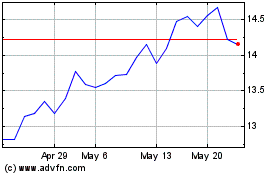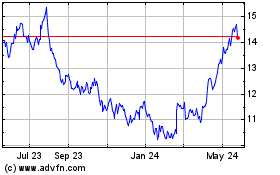HONG KONG—With China set to give global investors greater access
to shares listed in the southern boomtown of Shenzhen, some remain
wary of a stock market known for its rampant speculation.
A new trading link starting Dec. 5 will give international
investors access to more than 800 stocks listed on the $3.3
trillion Shenzhen stock market via Hong Kong's stock exchange. The
Shenzhen market, just across the border from the former British
colony, is home to some of China's fastest-growing technology
companies. It is also rife with speculative trading in small-cap
stocks with little institutional research coverage.
The market is drawing interest from investors hunting for
undiscovered gems, as some global stock indexes are hitting record
highs. It is also forcing investors to do their homework on
potential investments in different ways.
William Ma, chief investment officer at wealth manager Noah
Holdings (Hong Kong), said fund managers should seek on-the-ground
knowledge of a company before buying. "It's difficult to apply
traditional metrics to something like tech firms, which have less
business visibility. It's hard for management to make projections
about earnings when the industry changes so fast," he said.
Fund managers have used creative methods to get such
information, including visiting warehouses to see how much
inventory has piled up and checking expiration dates on products in
supermarkets to see how fast they are being sold, Mr. Ma said.
A few global investors already trade shares in Shenzhen through
a quota system, but it is too cumbersome and expensive for many
investors to access. As a result, foreign ownership of
Shenzhen-listed shares is tiny, just 1.2% early this year,
according to HSBC Holdings PLC.
Because foreign funds have had limited access to Shenzhen, few
large global investment banks have provided research reports on
companies trading there. The vacuum of institutional research, poor
disclosure by some listed companies, and a flood of retail traders
make Shenzhen one of the world's most volatile stock markets.
Shenzhen's benchmark stock index is down 7.7% this year, while
Hong Kong's Hang Seng Index is up 3.7% and the Dow Jones Industrial
Average is up 9.9% at a record high.
Trading in many of Shenzhen's small-cap stocks is driven by
rumors or speculation. Retail traders call these "demon stocks,"
when shares mysteriously rise in the absence of news or any change
in a company's fundamentals.
Chinese regulators hope the possible influx of foreign
institutional investors from the new stock link with Hong Kong,
called the Shenzhen-Hong Kong Stock Connect, will help damp
volatility in the Shenzhen market and boost transparency.
Yet foreign investors may be wary of buying in now, as Shenzhen
stocks are, on average, relatively expensive. Shenzhen's main index
trades at 50.4 times expected earnings for next year, while the
Nasdaq, to which it is often compared, trades at 28.18 times
forward earnings, according to Thomson Reuters data.
As a result, stock pickers are looking at some of the bigger
companies in Shenzhen, rather than to richly priced small caps.
Many foreign investors and global investment banks suggest buying
established companies with proven earnings and strong market
positions, including top Chinese brewer Wuliangye Yibin Co. and
video-surveillance-equipment maker Hangzhou Hikvision Digital
Technology Co.
Still, it is difficult to sort promise from peril.
LeEco Holdings, a tech company that creates online content and
sells smartphones and smart TVs, is one example. Acquisitive and
attractive to investors, it has showed much promise. But it said
recently that it faced a cash crunch after expanding too quickly.
Its Shenzhen-listed subsidiary, Leshi Internet Information &
Technology Corp., dropped nearly 5% on the news.
Sean Chen, director of strategy at Blackpeak, a firm that has
done due-diligence research for those looking to get into the
Shenzhen market, said investors often want a better understanding
of how management plans to expand a business. They also ask about
the background of management teams, their reputation and
competency, style and track record, he said.
Anthony Ho, chief investment officer of Asia ex-Japan equities
at asset manager Amundi, emphasizes the importance of channel
checks—or independent research on a company's business—to verify
the accuracy of company information. He said when earnings growth
is taken into account, high valuations may be justified.
Dennis Lam, head of Hong Kong and China markets at PineBridge
Investments, said, "In Shenzhen, it is even more important to know
management. It takes many, many meetings."
He said the firm will also speak to a company's suppliers and
factory line managers before investing.
Goldman Sachs Group Inc. recommends investors take a closer look
at "new economy" companies trading below 30 times this year's
expected earnings. Their list of names to buy in Shenzhen includes
Han's Laser Technology Industry Group Co., a laser-machine
manufacturer, and Sungrow Power Supply Co., a manufacturer of
renewable-energy hardware.
Macquarie recommends Shenzhen Rapoo Technology Co., which boasts
stable sales of its wireless-gaming software and is expanding into
robotics and drones. Another favorite is GoerTek Inc., which sells
a mix of digital consumer products and is expanding into virtual
reality.
Write to Anjie Zheng at Anjie.Zheng@wsj.com
(END) Dow Jones Newswires
November 27, 2016 20:55 ET (01:55 GMT)
Copyright (c) 2016 Dow Jones & Company, Inc.
Hang Seng Bank (PK) (USOTC:HSNGY)
Historical Stock Chart
From Nov 2024 to Dec 2024

Hang Seng Bank (PK) (USOTC:HSNGY)
Historical Stock Chart
From Dec 2023 to Dec 2024
